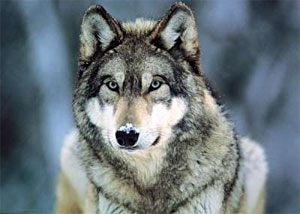Is wolf population too large in Belarus?
The wolf issue emerged quite a time ago. From time to time Belarus makes attempts to reduce populations of this predator that damages the nature and causes troubles to humans. In Western Europe this animal is protected as an endangered species. This arouses many questions relating to importing wolf game trophies abroad.
Belarus’ Nature Ministry admits that the country’s wolf community is a donor population for other European countries’ wolf populations. Our country adopted a wolf population management program to balance the benefits and harm that wolves bring to the nature.
“Wolf predation makes populations of all wild ungulates healthier improving their trophy qualities and average weight of hunted animals. One predator kills about 13 foxes and 19 raccoon dogs annually thus preventing transmission of the rabies virus as well as their affecting the number of hunted species such as grouses, ducks, roes, and hares,” says Natalya Zharkina, deputy head of the biological and landscape diversity directorate of the Belarusian Nature Ministry.
Too much of a good thing is not a good thing. It is clear that larger wolf populations needs more prey to feed thus posing a threat to other forest inhabitants. Researchers estimate a wolf’s annual need for food at 0.5-0.8 to 1.3-1.7 tons, and its daily food consumption at 1-2 to 36 kilos. Is it much? According to the latest surveys, Belarus has about 200 wolf packs numbering more than 1,300 animals. The density is approximately 1 or 2 animals per 100 sq km in rural and urban areas. Meanwhile, researchers argue that optimal number of wolves for our country is 72 packs with 504 animals.
Besides, this predator is not totally harmless to humans. According to the Belarusian Health Ministry, about 100 instances of aggressive behavior of wolves were registered in the past seven years – 14 cases a year on average. Of course, wolves do not kill humans, but still pose a danger to their safety. Also, the animals might be the rabies carriers, too. According to the Agriculture and Food Ministry, about 50 infected animals have been identified in the past eight years.
There are plans to develop wolf watching in Belarus, a new promising ecological tourism activity. This, however, does not mean that unregulated wolf breeding will be allowed. Wolf hunting remains very popular in Belarus. According to the hunting regulations adopted by the Presidential Decree as of December 8, 2005 No. 580, the wolf is a hunted animal and is classified as an invasive wildlife species. Paragraph 216 of the regulations says that hunters are allowed to hunt invasive animal species whenever they are lawfully present in the hunting territory with hunting purposes.
As a member of the Convention on International Trade in Endangered Species of Wild Fauna and Flora (CITES) from 1994, Belarus recognizes the status of the wolf as an internationally protected species. Besides, CITES is entitled to require an import permit for wolf pelts from the country of origin as well as impose restrictions on wolf pelt imports. With this in mind, in 2008 the EU Commission suspended wolf pelt imports from Belarus to the EU member states.
Formally, both countries that are taking effort to conserve the wolf and Belarus concerned with its increasing number are right. Hunters are trapped somewhere in between: on the one hand, they are allowed to shoot wolves in Belarus, and on the other, they cannot take their game trophies out of the country.
Hopefully, the wolf issue will be eventually settled. “In 2010 the CITES members and the EU states banned wolf imports from Belarus. The European Commission Directorate-General for the Environment suggested that we inform the European Commission of additional measures regarding trade in wolf trophies and hunting experience as well as coordinate the management program with neighboring countries. Last year the Directorate informed us that the CITES survey group for the EU member states was ready to review the plan of wolf population management in Belarus. We hope that the ban on importing wolf trophies in the EU will be cancelled,” says deputy nature ministers Anatoly Lis.











